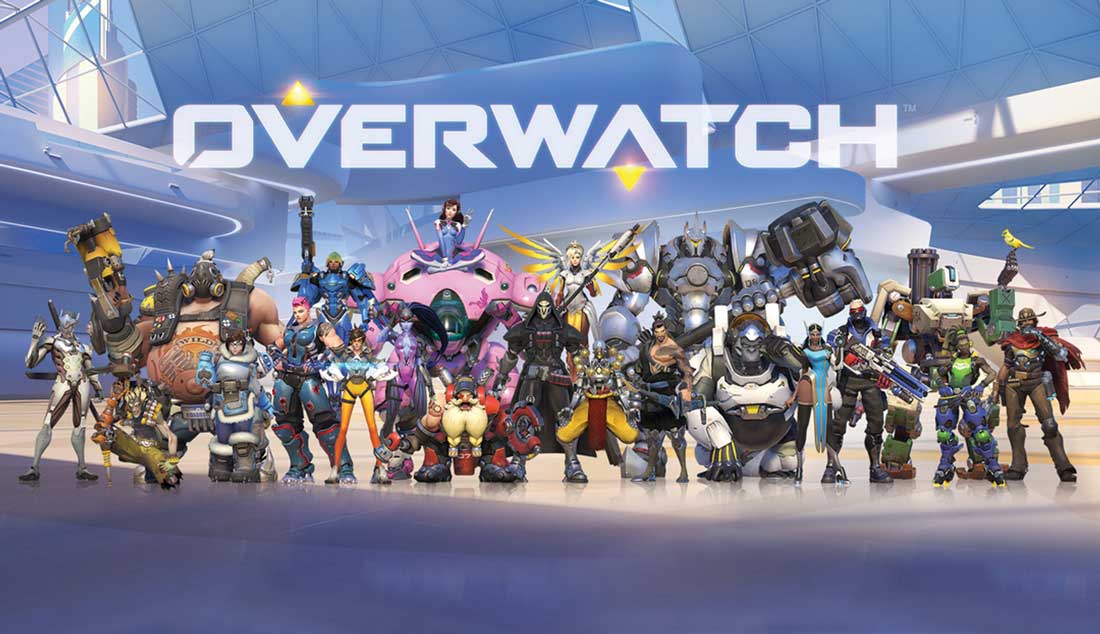The End of Overwatch: The Last Days of the Original
The end is nigh for the original Overwatch as the sequel draws closer

In June 2022, Overwatch abruptly reappeared on the top-seller charts, rising dozens of spots to land in the top ten for the month. It's actually not all that unusual for an older high-profile game to enjoy a sudden uptick in sales, and Overwatch wasn't even the only game to do so in June. Usually, this is due to some factor encouraging new sales - an end to an exclusivity period, for example, or a late-in-the-day piece of DLC.
What makes Overwatch so unusual in this regard is that it is not a box game that will be available indefinitely or a multiplayer title that's still being supported. Overwatch is, essentially, an obsolete game, one that will shortly go away to make room for its long overdue successor.
Indeed, Overwatch 2 is likely driving the sales of Overwatch, owing to Blizzard's decision to continue selling the older game as a glorified preorder pack for the sequel. It seems that people who hadn't played (or at least owned) the game before are buying in to get a jumpstart on the successor title. This does mean that the interest is in OW2 rather than its prelude, but that would also mean that there is still love for an IP that so many people have written off as dead.
As it turns out, though, there are still a lot of people playing the original game, even knowing that is essentially doomed. For fans of the title, it suggests that there could be a bright future for the game's colorful cast.
Unless, of course, Blizzard screws it all up. What, me, worry?

It's a secret to no one that Overwatch 2 has had a rough path to release, starting from the moment Blizzard announced it in 2019 and then almost immediately went radio silent. Since then, it's been one speedbump after another - from the long-time face of the game Jeff Kaplan leaving with little explanation, to the revelation that they'd named a character after one of the worst sexual harassers under the Activision umbrella. But the biggest problem may have been the confusion over what this new project was. For those who haven't been following it, it may seem obvious - OW2 is a sequel to OW. But the message from Blizzard was more along the lines of:
So we have this new project, Overwatch 2, but it's not really a sequel. It's more of a side game that will introduce a PvE mode and the original game will run alongside it. Well, it will have PvP, but it will be more of an engine and graphics upgrade. The core gameplay of the PvP won't be different, although we are going from 6-player teams to 5-player teams. But it's still more of an upgrade than a new game and you won't have to buy it, though you should pre-order it. Actually, it's going to be free to play with a battle pass system, so don't worry about the pre-order. Also, it's going to completely replace Overwatch because it is a new game.
Keeping in mind, of course, that this information would sometimes trickle out after months of silence.
Overwatch 2 has had easily one of the most confusing rollouts I've ever seen, which I can imagine has something to do with the nature of Blizzard as a company. They've always been known for their "When it's done" philosophy, with repeated delays of high-profile releases being the norm. But in the age of the live service title - with impatient players and even more impatient investors - that deliberate attitude doesn't fly. Everyone wants the game to come out as soon as possible, even if that means you're still hammering out the dents in the prototype as the new models are going to market.
One would think that Blizzard's experience with World of Warcraft would have made it a bit easier for them to break into the burgeoning live service space. Yet for all the success they've had with Overwatch, it never quite fit in with the likes of Apex Legends. It didn't update often enough, and didn't bring enough to the table to satisfy the serious enthusiast. Overwatch 2 is an attempt to remedy this.
But what about the people who are still back on the original?

One of the stickiest parts of Overwatch is also one of its better features: A reliance on teamwork. A great idea in concept, but it can quickly fall apart when you're loaded into a match with five strangers who may or may not be willing and able to communicate.
So it was when I dropped into Havana with five other players who didn't quite seem like they were all there. We suffered a brutal defeat in the first round, giving up the objective with four and a half minutes left (Read: We didn't even inconvenience them). But whereas many players would "tilt" - or give up and start playing stupid - these guys rallied like nothing I've ever seen. After squeaking out a hard-fought win in the second round, we proceeded to absolutely dominate in the third (during a match we pretty much had to play perfectly), then held the objective in the last round for a remarkable clutch victory. I know it was impressive because someone on the other team told me that his teammate was flinging slurs like there was no tomorrow - a fine example of that even temper that Overwatch players are known for.
It was one of the best matches I've ever played, made all the more remarkable in that it was a competitive match in a game where the ladder isn't going to be around for much longer.
Yes, there is still a competitive scene in Overwatch and a surprisingly robust one for a game that's just a few minutes from midnight. Even with the old competitive ladder about to be retired, people are still trying to climb. Even with OW2 set to feature a dramatically different playstyle, people still swap strategies and tips. It seems that there is still entertainment and even camaraderie to be found in this almost dead title.
I suspect that this is concentrated among the lower ranks of the game. As with any live service title, not everyone who plays Overwatch is created equal, and not everyone is equally considered when changes are made. The game is designed around the VIPs - Overwatch League, high-ranked competitive players, and content creators - who make up perhaps two or three percent of the overall player base. The rest of us are merely along for the ride.
From this perspective, the changes in Overwatch 2 - changes that push it away from its quasi-MOBA roots and toward a more conventional deathmatch-type game - make sense. I'm sure that people who are into the eSports scene are going to find the more frenetic matches in OW2 to be more interesting, especially after years of the original game stagnating into a handful of very slow strategies. But for others - for people who like OW because it's not a conventional FPS with conventional deathmatch gameplay - this might be their last chance to enjoy the game as it was (at least until Blizzard inevitably releases Overwatch Classic sometime around 2028).

In 2016, Overwatch put Blizzard at the top of the competitive gaming mountain, a position that brought with it no small amount of money. They didn't hold that spot for very long. We've all watched the biggest games get bigger and bigger with every year, and Blizzard's premature announcement of OW2 did not help their own prospects to return to the top.
To be fair, they have needed the time to work out some of the finer details. Namely: How are we going to monetize this thing now that loot boxes are radioactive?
Overwatch did not create the concept of the random item box - this is an honor that's usually given to Team Fortress 2, though I can think of a few obscure Chinese MMOs that had similar systems years before that - but it did popularize the concept and profit off it. For a time, videos and streams of people opening boxes were a popular form of OW content, providing a nice break from footage of grown men screaming at 13-year-olds. A few grim news articles and a battery of government hearings later, the idea is no longer so popular. While Overwatch was spared the worst of the outrage, it's clear to everyone that this system is not in the cards.
This has left Blizzard to come up with a new monetization system. After the controversy over the Diablo III auction house, this is probably not an area where they are keen to tread. But in the modern data-driven world, there's always a ready option: Copy what everyone else is doing.
Not long ago, some parts of an OW2 survey leaked out, a survey suggesting that Blizzard plans to pursue an especially aggressive monetization policy akin to that seen in Apex Legends. There's not much information to go on, which has left ample space for commentators to fill in the gaps. Are they seriously planning on charging $45 for skins, or are they just testing the limits of the player base? Will cosmetics still be available through gameplay? If so, which ones? How will this work with the battle pass system that they're also going to employ? So many questions and two more months before anyone will have any answers.
For the record, I am no whale. Not only have I never put any money into Overwatch, I even bought my copy on the cheap. Add that to my meager place on the ladder, and one thing becomes evident - however unimportant I am in the world of Overwatch, I'm going to be even less important in OW2. That's fine by me, as I am very much a tourist in this world even after hundreds of matches. But looking at some of the proposed prices makes me realize just how much of an outsider I am here.
So I guess I'd better enjoy the good old days while they last.

On August 9th, Overwatch began its final anniversary event - one last commemoration of how things were before the game metamorphoses into Overwatch 2. It is the last chance to unlock old cosmetics and it marks the official end of the loot box market.
Anniversary events are always enjoyable, even if there's been little to distinguish them ever since OW2 was announced. The special events are the same and the skins are all variations on a well-trod theme, but this anniversary's status as the last big hurrah has brought some people back. If nothing else, it's a good time to log in and spend all of those unused points before they are converted into one of the lesser in-game currencies in two months.
For good or ill, this is the end of an era, one that has seen thrilling highs and some truly baffling lows. The next phase could be a second golden age, or it might just be another step toward the path leading to live-service hell. Some people are holding their breaths.
As for me, I'm just enjoying them as they come. Overwatch is a frustrating game but it has moments of glory. OW2 will likely be no different. There are constants in life - losing your temper with your teammates may just be one of them.
